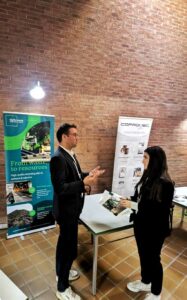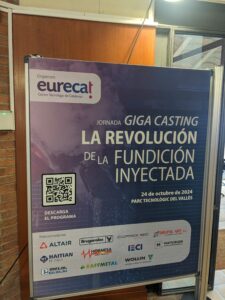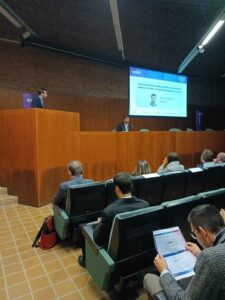Matvision: Sponsor of EURECAT’s Seminar on Aluminum Giga Casting Innovations
As a proud sponsor, Matvision recently took part in the Revolution of Injection Die Casting seminar hosted by EURECAT in Barcelona. This event focused on the transformative impact of giga casting on the automotive industry, initially pioneered
by Tesla. By consolidating multiple parts into just a few massive castings, this method facilitates vehicle assembly, reduces the number of parts, and enhances efficiency. Giga casting is on its way to set a new industry standard, with many automakers now adopting this technology to produce aluminum parts.



Aluminum recycling: How AI and robotics play a role
At the seminar, Matvision presented its advancements in aluminum recycling by showcasing AI-powered multisensor and robotic systems that support sustainable aluminum fusion processes. This technology allows for precise sorting of aluminum families, including those from post-consumer shredded automotive residues, commonly sourced from automotive shredder residues. By using sophisticated sensors like X-rays and LIBS (Laser-Induced Breakdown Spectroscopy), Matvision’s solutions ensure that aluminum recycling can meet the highest quality standards without sacrificing environmental goals.
The role of giga casting in the automotive industry
Giga casting technology, which started with Tesla’s Model Y, has reduced the vehicle’s assembly complexity by replacing up to 70
individual parts with a single cast piece in the rear underbody. This technology helps lighten vehicles, cut down on the number of robots needed for assembly, and simplify overall production, making it ideal for electric vehicle (EV) manufacturing. As more companies adopt this approach, the aluminum fusion and recycling industry is set to experience accelerated demand for quality-assured, post-consumer recycled aluminum.
With our giant casting machines, we are literally trying to make full-size cars in the same way that toy cars are made.
Elon Musk on X in 2021
Giga casting’s demand for mega infrastructure and investment
A look ahead: Matvision at POLLUTEC Paris
We extend our thanks to EURECAT for organizing this event and to the speakers and attendees for contributing to a rich exchange of insights. Next, Matvision will attend POLLUTEC Paris on November 26-27 to present our sorting solutions. Be sure to visit us at Stand H084-E to learn more about our AI-driven innovations in sorting.
Armed with a Master's in Engineering from ULiège, my professional journey spans over six years as an R&D Engineer at the GeMMe laboratory. During this time, I actively collaborated with the recycling industry, evaluating various technologies to improve recycling practices.
My expertise in sensor-based sorting has propelled me into the dynamic realms of #sensors, #robotics, #recycling, #rawmaterials, and #circulareconomy. Each blog article serves as an exploration of our groundbreaking work at Matvision, where we harness cutting-edge technology to reshape the future of recycling.
- Matvision at Pollutec Paris on Nov. 26 and 27 - 22 November 2024
- Matvision at Aluminum Giga Casting Seminar by EURECAT - 13 November 2024
- Targetting the hidden part of the waste iceberg - 1 July 2024